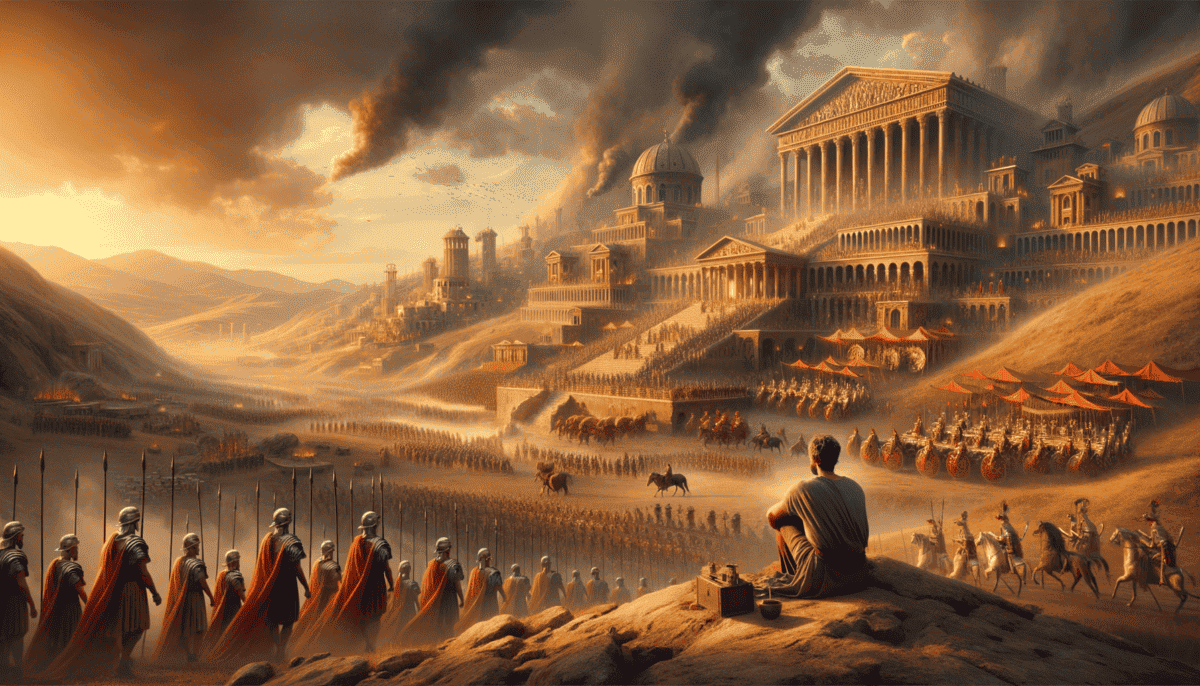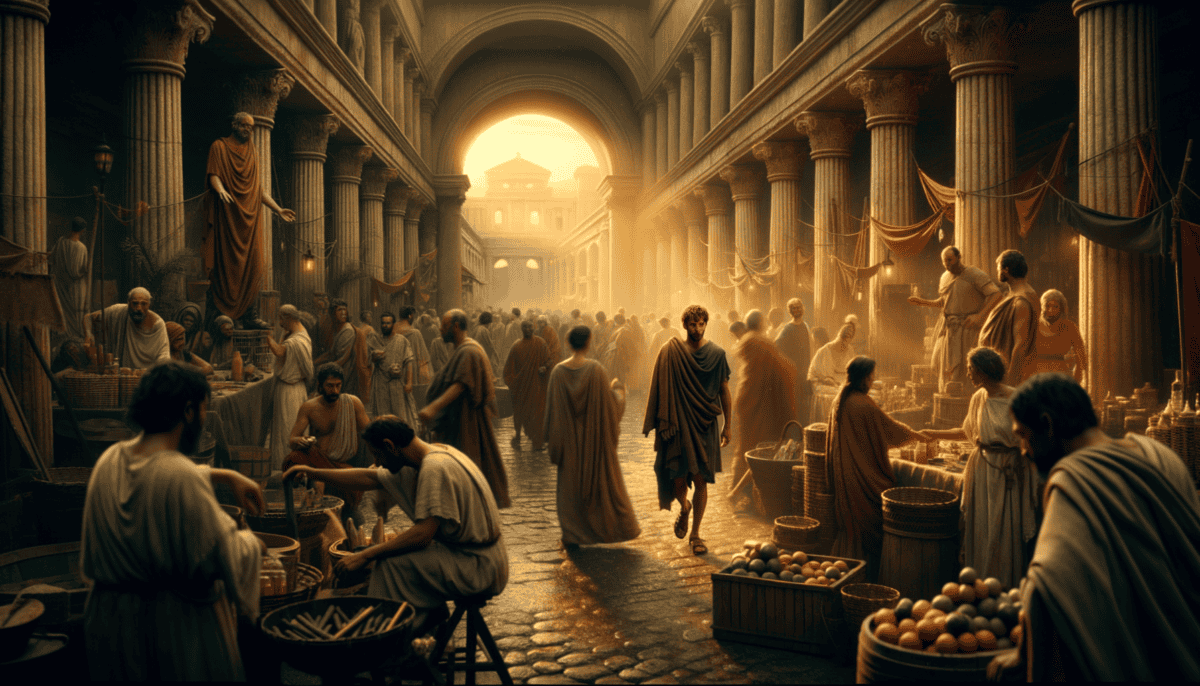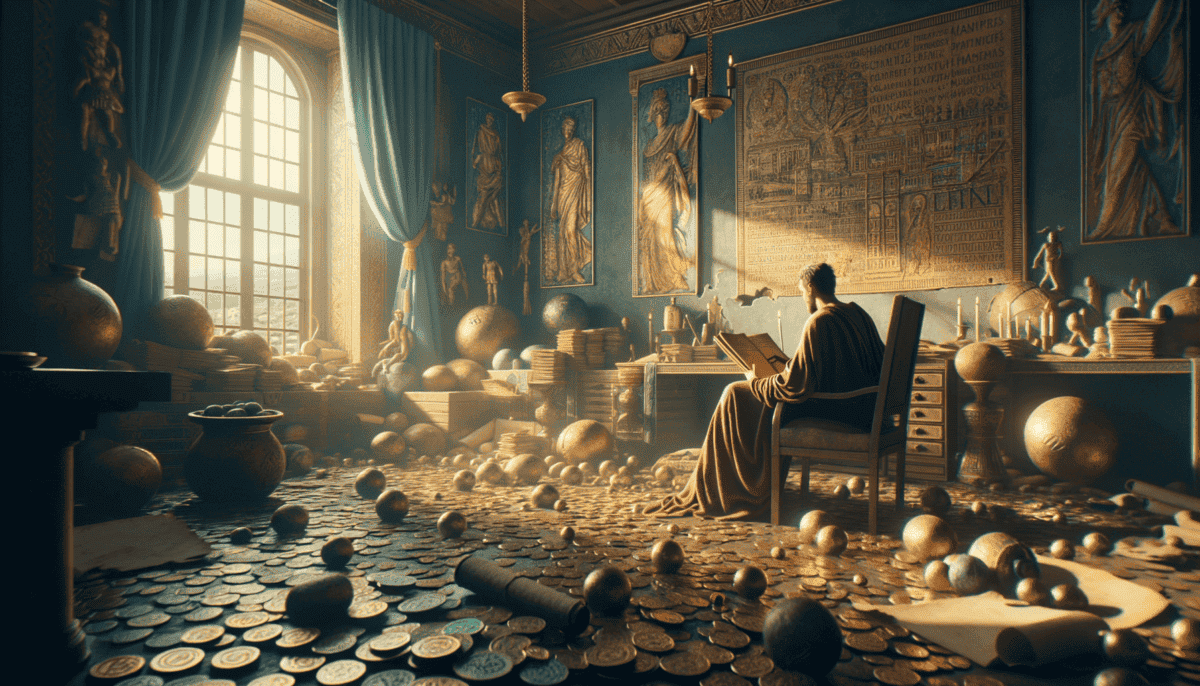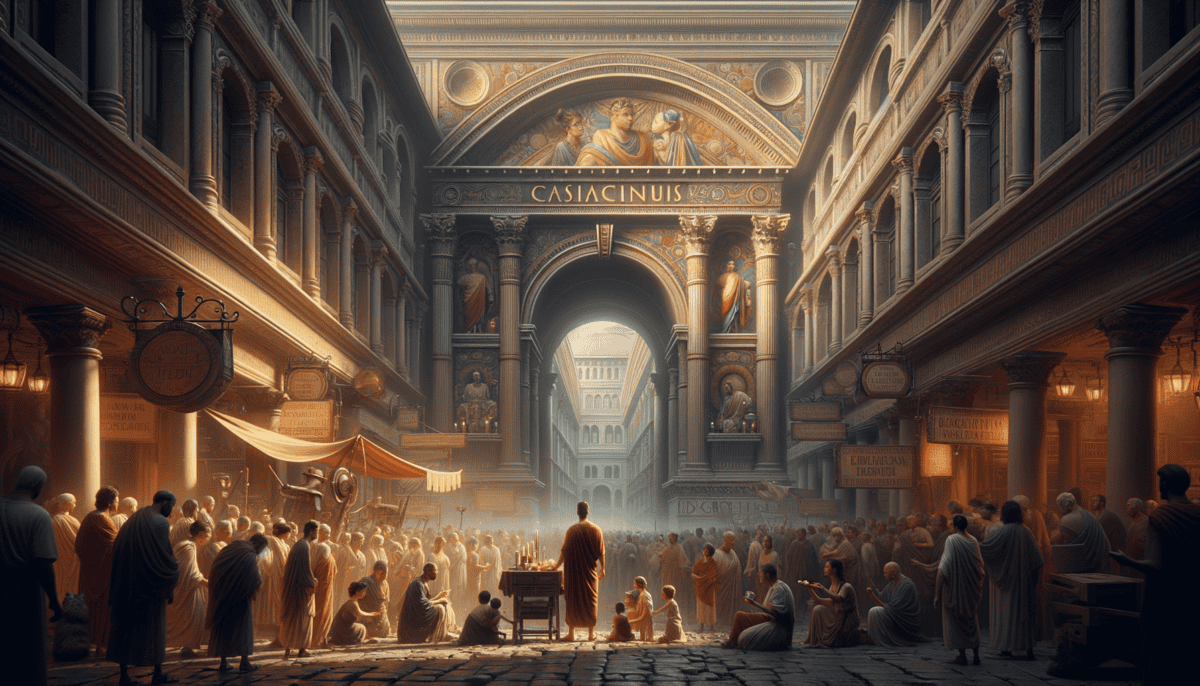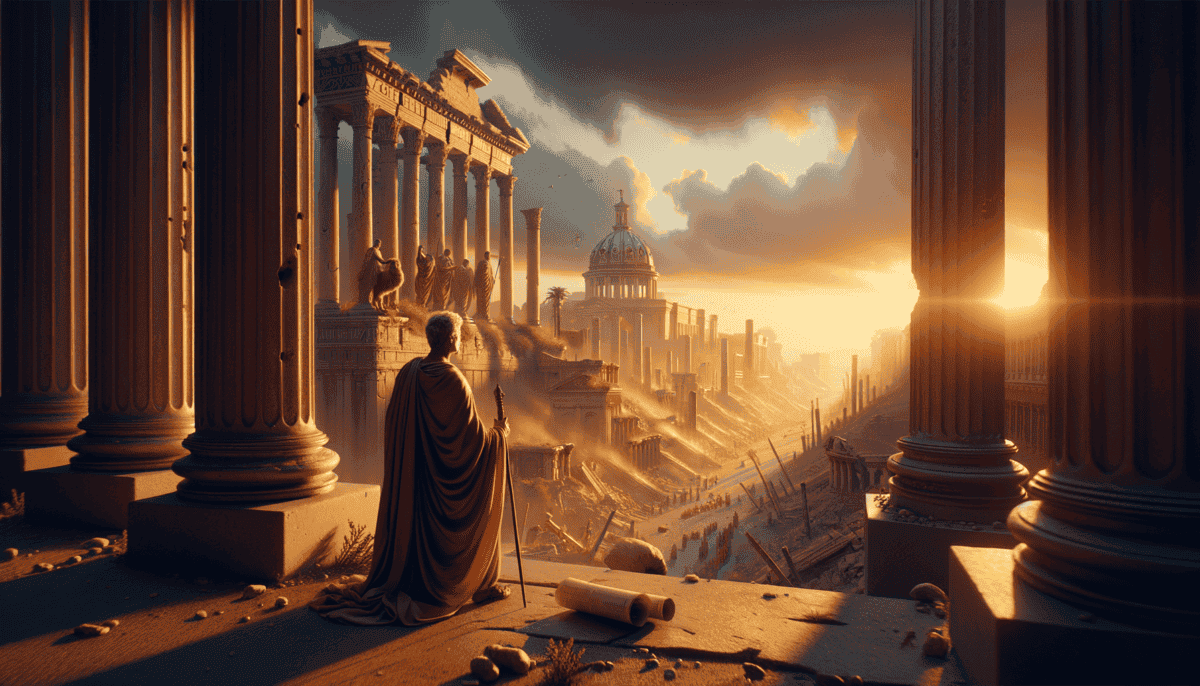The Golden Chains: Rome’s Financial Downfall
Marcus stood at the marble balcony of his family's villa, watching the golden sunset paint the city of Rome in warm hues. At twelve years old, he had never known anything but luxury. The sweet smell of honey cakes drifted up from the kitchen below, making his mouth water.
"Father, why do we have so much gold?" Marcus asked, running his fingers along the smooth golden railings.
Senator Quintus looked up from his scrolls with a proud smile. "Because we are Romans, my son. We are the mightiest empire in the world."
The city sprawled before them in all its glory. Gleaming temples reached toward the sky. Fountains sparkled in the evening light. Market stalls overflowed with exotic spices, silks, and jewels from distant lands.
• 1 million citizens in Rome
• 8,000 pounds of gold in the treasury
• 50,000 miles of roads
• 200 marble temples
But even as a boy, Marcus noticed things that seemed… odd. Like how his father frowned more when reading financial scrolls. Or how the gold coins felt lighter than they used to.
"Look there," his father pointed to a new golden statue being erected in the forum. "That's Emperor Commodus. He loves building grand things."
"It's beautiful," Marcus said. "But didn't you say the treasury was running low?"
Quintus's face darkened. "Clever boy. Yes, our spending grows while our gold shrinks. But we mustn't speak of such things openly."
A commotion in the street drew their attention. A merchant was arguing with a customer about prices.
"Ten denarii for a loaf of bread? Last month it was three!" The customer's angry voice carried up to the balcony.
"Costs are rising! I must feed my family too!" The merchant shot back.
Marcus turned to his father. "Why are prices going up?"
"It's… complicated, my son." Quintus sighed deeply. "Our empire has grown so vast, it takes enormous wealth to maintain it. We spend more than we earn."
Like a mighty tree with golden leaves but rotting roots, Rome's wealth masked deeper problems. Young Marcus was beginning to see the cracks in the glittering facade.
That night at dinner, served on golden plates, Marcus watched his father meet with other senators. Their worried whispers carried across the atrium:
"The military needs more funding…"
"Tax revenues are down in the provinces…"
"The emperor's new palace is draining the treasury…"
Marcus lay awake that night, the cool breeze carrying distant sounds of the eternal city. Rome seemed invincible, wrapped in its golden chains of wealth. But something was changing. He could feel it in the worried faces of adults, the rising prices in the markets, the growing unrest in the streets.
Little did Marcus know, he was witnessing the beginning of a crisis that would shake the mighty Roman Empire to its foundations. The glitter of gold couldn't hide the truth forever.
“A tree with rotten roots cannot bear golden fruit forever.” – Old Roman saying
Tomorrow would bring another sunny day in Rome. The fountains would flow, the temples would gleam, and life would go on as usual. But beneath the surface, the cracks were spreading. The question wasn't if the facade would crack, but when.
A cool night breeze rustled the silk curtains as Marcus drifted off to sleep, dreams filled with golden coins that turned to dust when touched.
The Price of Glory
The morning sun glinted off thousands of bronze shields as Marcus watched the legions march through Rome’s gates. His father had brought him to witness the army’s departure for their latest campaign. ️
“Look at their equipment, Marcus,” Senator Quintus pointed. “Each soldier carries over fifty pounds of the finest armor and weapons Rome can produce.”
• Each soldier’s equipment costs 1,000 denarii
• Daily pay for 100,000 soldiers
• Food for men and horses
• Siege weapons and supplies
“It’s amazing, Father!” Marcus exclaimed. “But who pays for all this?”
Before Quintus could answer, General Flavius approached them. His armor sparkled with gold trim, but his face was grim.
“Senator Quintus, we need to talk about the campaign budget,” Flavius said quietly.
Marcus pretended not to listen as the men spoke in hushed tones:
“The costs keep rising, Flavius. The treasury cannot keep up.”
“We need more men, more weapons. The northern tribes grow stronger.”
“Perhaps if we made peace instead—”
“Peace?” Flavius scoffed. “Rome doesn’t make peace. Rome conquers!”
The cost of empire was measured not just in gold, but in the strain it placed on every aspect of Roman life.
Later that day, Marcus visited his friend Lucius, whose father worked in the imperial mint. They snuck down to watch the coin-makers at work.
“See how they mix the silver?” Lucius whispered. “Father says they add more copper now than before. Makes the coins worth less.”
“Why would they do that?” Marcus asked.
“To make more coins with less silver. The army needs paying.”
A worker looked up and shouted, “Hey, you boys! Out!”
They ran away laughing, but Marcus couldn’t forget what he’d seen. That evening, he examined a denarius coin carefully.
“The face of the emperor shines bright, but the metal beneath grows darker with each passing year.” – Marcus’s observation
At dinner, Marcus heard more troubled talk:
“Three new legions formed this year…”
“The frontier keeps expanding…”
“How long can we afford this?”
Marcus approached his father’s study that night, finding him surrounded by scrolls covered in numbers.
“Father, why do we keep conquering new lands if we can’t afford it?”
Quintus looked tired. “Because, my son, an empire that stops growing begins to die. But you’re asking good questions. The right questions.”
The next morning, watching another legion march out, Marcus noticed something new: how many ordinary citizens looked away instead of cheering, how the soldiers’ gold trim seemed less bright, how the weight of empire hung heavy in the air.
Through young eyes, Marcus was witnessing a crucial truth: Rome’s greatest enemy wasn’t at its borders, but within its own treasury. The mighty legions marched on, but each step took them closer to an invisible edge.
As the dust settled on the departing army, Marcus picked up a dropped coin. The emperor’s face stared back at him, but the edges were wearing thin. Just like Rome’s finances, some things looked better from a distance than up close.
Bread and Burdens
The marketplace buzzed with angry voices. Marcus pushed through the crowd, trying to hear what was happening.
“Ten denarii for a loaf of bread?” a woman shouted. “Last month it was three!”
The baker wiped his sweaty forehead. “The grain merchants charge me more every day. I can’t help it!”
• Bread prices triple
• Taxes getting higher
• People can’t buy food
• Workers losing jobs
Marcus watched as Julia, his family’s cook, haggled with vendors. She looked worried.
“Even the senator’s household feels the pinch,” she muttered. “Your father’s purse isn’t as full as it used to be, young master.”
A commotion drew their attention. Tax collectors were arguing with a shopkeeper:
“But I’ve already paid twice this year!” the man pleaded.
“Emperor’s orders. New tax for the war effort.”
Marcus remembered his father’s words about the expensive armies. Now he saw how regular people paid the price.
“When coins lose their value, people lose their hope.” – Old Roman saying
Walking home, Marcus passed the poor district. More people than ever huddled in doorways, their clothes ragged.
“Look there,” Julia pointed to a closed workshop. “The potter’s family worked there for generations. Now they can’t afford clay.”
At home, Marcus found his father in a heated discussion with other senators:
“The people grow restless,” one said.
“We can’t tax them more,” another argued.
“But the army needs funding!”
Marcus’s father stood up. “If we squeeze them too hard, we’ll have riots in the streets.”
The weight of empire pressed down on every Roman citizen, from the poorest to the richest.
Later, Marcus helped Julia count the household money.
“See these old coins?” She showed him two denarii. “This one from last year is almost pure silver. This new one? Mostly copper with silver coating.”
“Is that why prices keep going up?” Marcus asked.
“Smart boy. People don’t trust the new coins. They want more of them for the same goods.”
That evening, a crowd gathered in the forum. Marcus watched from his window as a man stood on a crate to speak:
“Our grandfathers built this empire with strong hands and honest coins! Now look at us – paying for endless wars with worthless metal!”
Guards moved in to break up the gathering, but Marcus had seen enough. The Empire’s problems weren’t just in far-off battles anymore – they were right here in Rome’s streets.
The next day, he saw something that stayed with him: a rich merchant’s son he knew was selling his toys in the market.
“Father says we need the money,” the boy said quietly.
Marcus realized then that no one was safe from the growing crisis. Rich or poor, senator or shop owner – everyone felt the golden chains of Rome’s debt tightening around them.
As night fell over the city, the usual sounds of commerce grew quieter. Shops closed early, their owners counting dwindling coins. In the darkness, Marcus heard his father whisper to his mother:
“The foundation cracks, my dear. And I fear what happens when it finally breaks.”
Money Gone Wrong
Marcus sat in his father’s study, holding two coins in his small hands. One shone bright and felt heavy. The other looked dull and felt light.
“Father, why are the new coins different?” he asked.
His father sighed. “The treasury is running low, son. They mix cheaper metals with silver now.”
• Old coins were pure silver
• New coins are mixed metals
• People don’t trust new money
• Prices keep going up
In the marketplace, chaos erupted. A merchant threw down a handful of coins in anger.
“These aren’t worth the metal they’re made from!” he shouted. “I won’t accept them!”
The customer argued back: “It’s all we have! What choice do we have?”
Marcus watched as Julia tried to buy food with the new coins. Many sellers shook their heads.
“A coin’s worth isn’t in its shine, but in what people believe it can buy.” – Marcus’s father
At home, servants whispered about rich families selling their jewelry. Even senators were struggling to maintain their lifestyle.
“Young master,” Julia called. “Come see this.”
She showed him two price lists, just months apart:
| Item | Old Price | New Price |
|---|---|---|
| Bread | 2 coins | 15 coins |
| Oil | 5 coins | 30 coins |
“The numbers keep getting bigger,” Marcus noticed. “But why?”
“When money loses value,” Julia explained, “it takes more coins to buy the same things.”
One evening, Marcus overheard a secret meeting in his father’s study. Several worried-looking senators gathered around a table.
“The mint workers are stealing silver,” one whispered. “Making fake coins at home.”
“Can you blame them?” another replied. “The official coins are barely better than fakes now.”
Marcus’s father rubbed his temples. “We’re printing money like it’s paper, but our vaults are empty.”
Outside, a group of soldiers marched past. Their armor wasn’t as shiny as before. Their weapons looked older.
“Even the army feels it,” a guard told Marcus. “They pay us with these new coins, but merchants want more and more for supplies.”
That night, Marcus watched from his window as people lined up at a temple, trading their coins for goods they could trust – salt, oil, and metal tools.
A wealthy neighbor’s villa stood empty now, with a sign: “For Sale – Will Accept Grain or Gold Only.”
“When money dies,” his father explained, “people go back to trading things they can hold and use.”
The next day, Marcus saw something strange in the forum. People were using scales to weigh coins instead of counting them.
“We trust the weight of metal more than the emperor’s stamp now,” a merchant explained.
As darkness fell over Rome, the sound of hammering echoed through the streets – people breaking apart old statues and metalwork, saving anything of real value. The Empire’s glory was being melted down, coin by coin.
When Everything Falls Apart
The streets of Rome weren’t the same anymore. Marcus watched as people rushed around with worried faces.
“Young master,” Julia called, her voice shaking. “We couldn’t buy food at the market today. The merchants won’t take our coins anymore.”
• Empty markets
• Closed shops
• Hungry people
• Angry crowds
Marcus’s father paced in his study. “Many workers lost their jobs,” he explained. “The builders, the artists, even some soldiers.”
“But why, Father?” Marcus asked.
“Nobody has good money to pay them anymore, son.”
Outside their villa, a crowd gathered. They looked hungry and angry.
“The rich hide their wealth while we starve!” someone shouted.
Marcus’s family had to let most of their servants go. Only Julia stayed, more like family than a servant now.
“Remember when we had feasts every week?” Marcus asked Julia.
“Now we’re lucky to have bread,” she replied softly.
In the forum, shops closed one by one. Marcus saw signs everywhere:
| Shop Type | Status |
|---|---|
| Bakery | CLOSED – No flour |
| Blacksmith | CLOSED – No metal |
One morning, soldiers came to their neighborhood. They wore dirty armor and looked tired. ️
“The army can’t defend the borders anymore,” Marcus heard his father tell his mother. “We can’t pay or feed the soldiers.”
News came that barbarians were getting closer to Rome. They knew the Empire was weak.
“What’s happening to our city?” Marcus asked his father.
“It’s like a sick person, son. When money gets sick, everything else gets sick too.”
At night, Marcus could hear people fighting in the streets. Some broke into empty houses looking for food.
Even their grand villa felt different. Many rooms were cold now – they couldn’t afford wood for all the fireplaces. ️
“We must stay strong,” his father said during dinner, which was just bread and thin soup. “Many noble families have already left Rome.”
Julia taught Marcus how to grow vegetables in their courtyard. “Better than gold now,” she said, planting seeds.
The rich marble columns of the forum started to look dirty. Nobody cleaned them anymore. Weeds grew between the stones.
“Rome was built with gold,” an old senator told Marcus, “but it’s falling apart without it.”
One day, Marcus saw his father bury a chest in their garden at night.
“What’s in there?” he asked.
“Real gold coins, son. From before. Keep this secret – we might need them to escape.”
The next morning, Marcus looked at their city from a hill. Rome still looked big and beautiful from far away. But up close, you could see it was breaking.
“Will Rome ever be rich again?” Marcus asked Julia.
She hugged him tight. “Things change, little one. But people are stronger than coins.”
That evening, as the sun set behind the seven hills, Marcus watched people trading vegetables for meat, blankets for oil. They were learning to live in a new way, without the golden chains that had held their empire together.
Lessons From The Ruins
Marcus sat on a fallen column, watching the sunset over Rome. The city looked different now.
“Remember when these streets sparkled with gold?” Julia asked, sitting beside him.
“Now we know gold isn’t everything,” Marcus replied wisely.
Money isn’t real wealth. Real wealth is:
• Food you can grow
• Skills you can use
• Friends who help
• Knowledge that lasts
People found new ways to live. Markets changed. Instead of using worthless coins, people traded things they needed.
“I’ll give you these vegetables for some of your bread,” a woman offered to another.
Marcus’s family garden grew bigger. Julia taught other families how to grow food too.
“We eat better from our garden than we did with all our gold,” Marcus’s mother said, serving fresh vegetables.
His father nodded. “The Empire’s greed made us forget the simple things.”
Some rich families who stayed in Rome learned to work with their hands. Marcus saw a former senator’s son learning to be a carpenter.
| Old Job | New Skill |
|---|---|
| Money Counter | Farmer |
| Tax Collector | Builder |
Marcus helped start a school under an old olive tree.
“We don’t need fancy buildings to learn,” he told the children. “Just willing minds.”
One day, a traveler came from far away. He saw Marcus teaching.
“Your city was the richest in the world,” the traveler said. “What happened?”
Marcus thought carefully before answering. “We thought gold made us strong. But real strength comes from people working together.”
The traveler wrote this down. “Other cities should know this story.”
Julia smiled. “Maybe they’ll learn from our mistakes.”
Years passed. Rome changed. It wasn’t the mighty empire anymore, but something new grew from the ruins.
“Look,” Marcus said to his own children years later. “See those broken marble columns?”
“They’re pretty, Father,” his daughter said.
“They remind us of an important lesson. When we chase only gold, we lose what really matters.”
The children played in the community garden that once was a fancy marketplace. Their laughter echoed off old stone walls.
Sometimes, Marcus found old coins in the dirt while gardening. He kept one to remember.
“What’s that, Father?” his son asked.
“A reminder,” Marcus answered. “Money is just a tool. It’s not the real treasure.”
As the sun set on another day, Marcus watched his children help their neighbors harvest vegetables. The city had less gold now, but more sharing, more helping, more real wealth.
“Rome didn’t fall,” he told Julia, now gray-haired but still wise. “It just learned a better way to be rich.”
And so, the story of Rome’s golden lesson lived on, teaching people everywhere that true wealth isn’t about having the most coins, but about building something that really matters – together.


